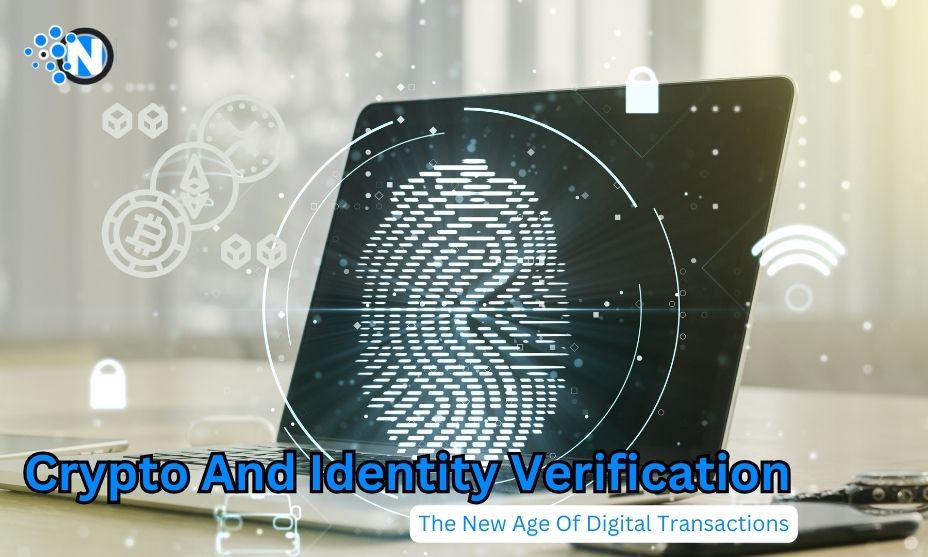Crypto And Identity Verification: The New Age Of Digital Transactions

One cannot ignore the value of identity verification in the digital era when transactions are going more and more online. The emergence of cryptocurrencies, frequently announced as the money of the future, has brought both new potential and problems to this field.
This blog post will reveal the complex connection between crypto and identity verification, emphasizing its importance in guaranteeing safe and transparent transactions.
Introduction of Digital Identity
Let’s define digital identification before we go too far into the crypto world. Said another way, it’s a digital copy of private data. Digital identity provides a similar function online, much like presenting your ID document at an actual.
The decentralized character of cryptocurrencies presents a special problem, though. Without a single authority, how can you confirm someone’s identity?

Cryptocurrencies And Secrecy
One of the main draws of cryptocurrencies such as Bitcoin was the assurance of secrecy. False transactions meant that, although transaction information was available to the public, it was difficult to identify the people behind them.
Both a blessing and a curse were these characteristics. Private as it was, it also turned into a sanctuary for illegal activity.
Verifying Identity in Crypto
The cryptocurrency business developed and became more widely accepted, necessitating stronger security measures. The following justifies the need for identity verification:
Regulatory Compliance
Countries implement worldwide restrictions to ensure transparent cryptocurrency transactions.
Especially the ones on anti-money laundering (AML) and combating the financing of terrorism (CFT), ID verification makes it easier to comply with these regulations.
Protection
Verifying the identification of those engaged in a transaction might provide an extra degree of protection given the growing amount of cyberattacks. However, you can also connect your trading accounts with reliable bots. Now you may wonder which bot to select. You can go with Immediate Edge as your trading guide for a secure trading journey.
Hope
Trust has to be established if cryptocurrencies are to become more widely used. It can increase customer and merchant confidence to know that a mechanism is in place to confirm user identity.
Crypto Platforms’ Identity Verification Implementation
Many cryptocurrency platforms and exchanges have begun putting Know Your Customer (KYC) protocols into place. They are doing it in this way:
Document Verification
Passports, driver’s licenses, and utility bills are examples of the paperwork that users must upload. The sophisticated algorithms confirm the legitimacy of these records.
Identification By Biometrics
Some platforms have taken a further step by including biometric verification, such as facial recognition or fingerprint scans.
Dual Factor Authentication (2FA)
Users using 2FA, an extra degree of protection, must validate their identity by entering a code delivered to their email or mobile device.
What Does The Future Hold?
The idea of decentralized identity verification is among the most fascinating advancements in the always changing crypto world. For this purpose, blockchain the fundamental technology of cryptocurrencies is being investigated.
The notion is to return identification control to the person. With blockchain identity verification, users can guarantee their privacy and security without depending on a central authority.
Challenges To Consider
Identity verification integration in the crypto space is not without difficulties, even though it is a step in the right way. Those consist of:
Privacy Issues
It’s important to strike a balance between user privacy and identity verification. Users who respect their privacy may be discouraged by too stringent verification. For additional privacy, shields consider trading with bots like immediate edge. These bots help in securing your digital currency from potential scams.
Worldwide Standardization
Because cryptocurrencies operate worldwide, we need globally acknowledged standardized identity verification procedures.
Technology Obstacles
Considering the wide range of technology available, it can be difficult to guarantee that identity verification procedures are smooth, and rapid, and don’t discourage consumers.
Tips to Increase Crypto Storage Safety Online
You can greatly lower the risk of unwanted access and possible loss of your digital assets by putting these suggestions into practice and securing your online crypto storage.
Select Reputable Exchange Platforms
Make use of exchange platforms that are well-known, trustworthy, and have a solid security record. Examine the platform’s security precautions, such as its insurance plans, security audits, and encryption.
Turn on Multi-Factor Authentication (MFA)
Adding multi-factor authentication will improve the security of your account. This strengthens the verification process and increases the difficulty for unauthorized individuals to get to your funds.
Use Encrypted Cloud Storage
Make use of secured cloud storage services if you need to keep private keys or backup data online. Make sure the service has strong encryption and that its security measures are updated on a regular basis.
Update Security Software Frequently
Make sure that your firewall, antivirus, and anti-malware software, as well as your computer and web-based storage services, are up to date. Frequent upgrades guard against emerging security risks.
Employ Strong Password Management
To generate and keep strong, unique passwords for your cryptocurrency storage accounts, use a password manager. Don’t reuse passwords on different websites; instead, change them frequently.
Ending Note
Crypto as well as identity verification and getting married is evidence of the industry’s progress. The main goal while we follow this route should be to build safe, user-privacy-preserving, and globally compliant solutions. Transparent and reliable transactions are what blockchain technology combined with identity verification promises to bring about in the future. As transactions migrate more and more online in the digital age, identity verification is essential. In this field, cryptocurrency presents both new chances and difficulties since they need strong identity verification for safe and transparent transactions.
The decentralized structure of cryptocurrency complicates identity verification, but regulatory compliance and cyberattack protection require robust security measures. On cryptocurrency sites, Know Your Customer (KYC) procedures, and biometric verification, including two-factor authentication improve security. Blockchain-based decentralized identity verification is the way of the future to protect user privacy. For digital transactions to continue developing and to be trusted, privacy, standardization, and technological barriers must all be balanced.
To ensure security and compliance in the evolving crypto space, it is crucial to understand how regulatory frameworks shape identity verification practices. Those looking to learn about KYC and AML in crypto will find that these protocols help prevent illicit activities like money laundering and fraud while fostering trust among users. Implementing these measures not only enhances platform security but also aligns businesses with global financial regulations, ensuring a safer and more transparent crypto ecosystem.




